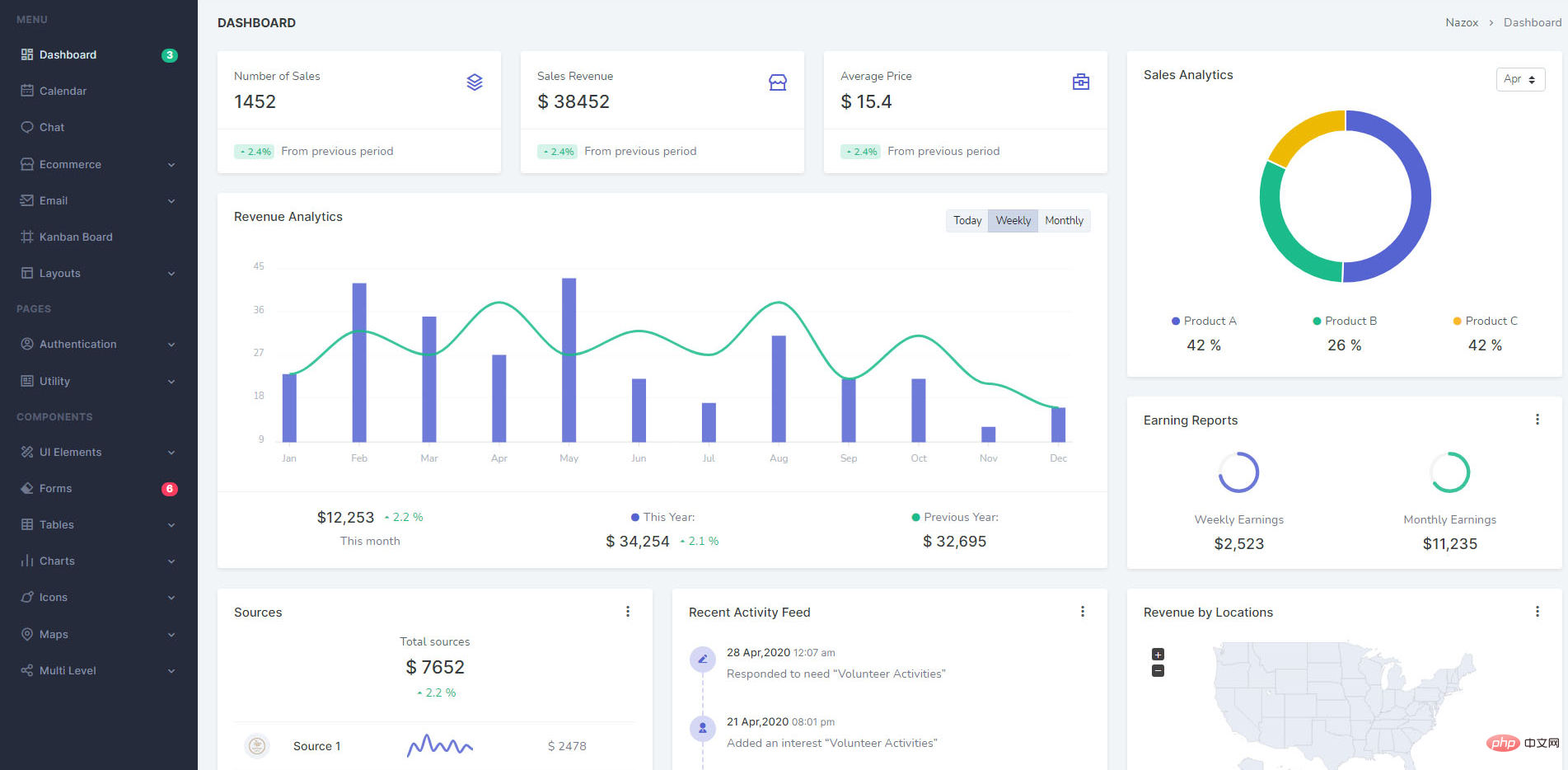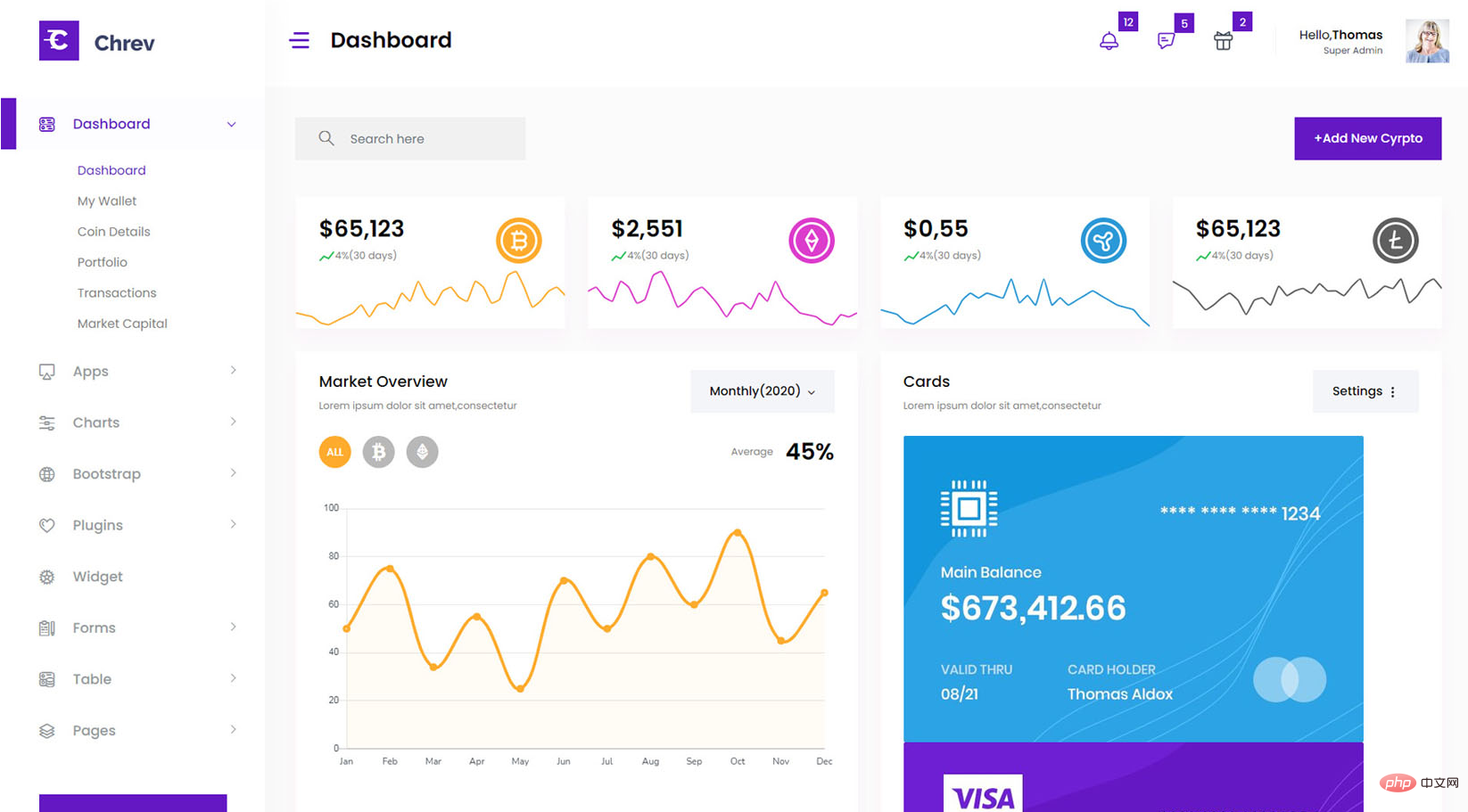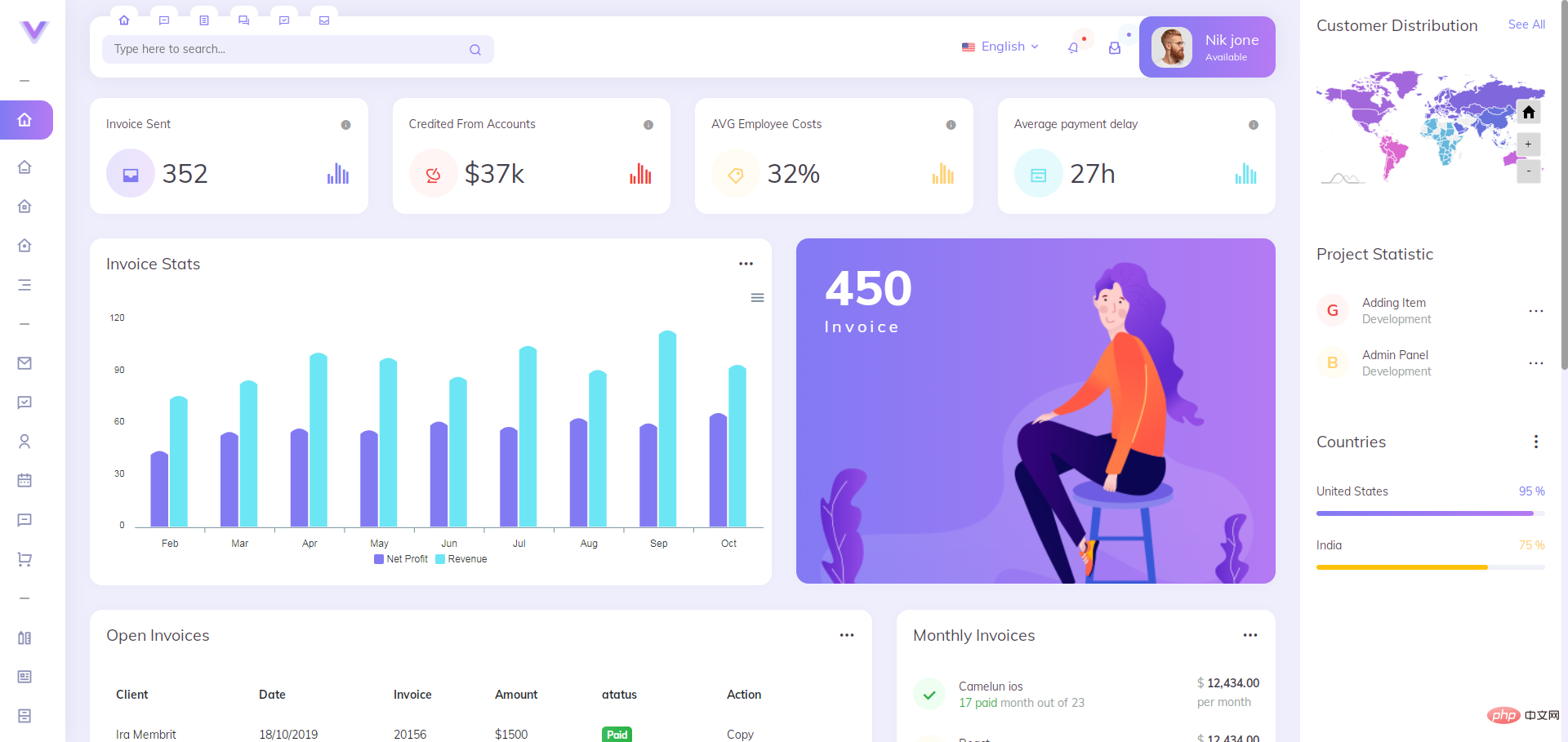 PHP Framework
PHP Framework
 Laravel
Laravel
 6 cool and practical Laravel backend management templates (free download)
6 cool and practical Laravel backend management templates (free download)
6 cool and practical Laravel backend management templates (free download)
A good website cannot just look at its appearance. The background of the website is also very important. This article will share with you 6 cool and practical Laravel backend management templates, which can be downloaded for free! If you want to get more website templates, please pay attention to the php Chinese website source code column!
1. Laravel and TailwindCSS background management template-Midone

Template introduction: Midone is a set of high-quality Laravel management Background template, TailwindCSS framework component template. Front-end scaffolding and directory structure design and production use. The template has several unique pages and components to help you quickly build an admin application. At the same time, you can focus on developing projects without worrying about front-end HTML template integration.
Effect preview and download address: //m.sbmmt.com/xiazai/code/6944
##2. Powerful Laravel management background UI Framework source code - Nazox

//m.sbmmt.com/xiazai/code/6943
##3, HTML and Laravel digital currency system Management template - Chrev
 Template introduction: Chrev is a digital currency system interface template, including two versions of HTML and Laravel source code. Cryptocurrency trading systems, digital currency management systems, etc. can be created. Of course, this set of templates can also be used to create any other website backend and web applications, because it contains commonly used web page elements and components.
Template introduction: Chrev is a digital currency system interface template, including two versions of HTML and Laravel source code. Cryptocurrency trading systems, digital currency management systems, etc. can be created. Of course, this set of templates can also be used to create any other website backend and web applications, because it contains commonly used web page elements and components.
Effect preview and download address:
//m.sbmmt.com/xiazai/code/6942##4. laravel8 bootstrap management background template UI Framework-Dashmix
Template introduction: Dashmix is a fully responsive commercial bootstrap management background template, including the template and UI framework implemented by Laravel8. Built in Sass and ECMAScript6 (ES6) and smart tools like webpack5, Babel7, and Gulp4, it will save you time and help you build your projects faster and more efficiently. Templates will enable you to build a variety of page layouts quickly and powerfully. This set of backend templates is a professional, flexible, modern and full-featured admin backend template that can be used to create UI for all projects: web applications, website backends, websites, custom admin panels, admin dashboards, CMS, CRM Even a blog, corporate website. 
//m.sbmmt.com/xiazai/code/6844
##5. Vuejs Laravel management background system template Framework
# Template introduction: A set of simple VueJS Laravel management templates, a management backend template implemented using Vuejs2, Laravel 5.4 and Bootstrap4. There are a large number of management background templates in the Bootstrap template library, but there are not many management frameworks created using VueJS. You will definitely like this set of VueJs Laravel management templates that are simple and easy to use. The biggest advantage of web pages built using VueJs compared to traditional HTML pages is that they load JS and CSS at once, and there is no refresh effect when linking to other pages.
 Effect preview and download address:
Effect preview and download address:
##6, html vue laravel management background template Front-end framework Vito
Template introduction: Vito is a powerful management background template front-end framework. The template contains three sets of independent source codes, Vue Laravel HTML. No matter which coding method you are familiar with, this management backend can meet the requirements and can create any type of website backend system or web management software.
Effect preview and download address:  //m.sbmmt.com/xiazai/code/6828
//m.sbmmt.com/xiazai/code/6828
More back-end templates can be downloaded Visit: //m.sbmmt.com/xiazai/code/houduan
Related recommendations:
《8 Bootstrap corporate website templates (source code free download)》
《10 beautiful and practical models Bootstrap background management system template (come to download)》
《10 excellent vue background management system template recommendations (free download)》
- ##《
7 simple layui background management template recommendations (free download)》
The above is the detailed content of 6 cool and practical Laravel backend management templates (free download). For more information, please follow other related articles on the PHP Chinese website!

Hot AI Tools

Undress AI Tool
Undress images for free

Undresser.AI Undress
AI-powered app for creating realistic nude photos

AI Clothes Remover
Online AI tool for removing clothes from photos.

Clothoff.io
AI clothes remover

Video Face Swap
Swap faces in any video effortlessly with our completely free AI face swap tool!

Hot Article

Hot Tools

Notepad++7.3.1
Easy-to-use and free code editor

SublimeText3 Chinese version
Chinese version, very easy to use

Zend Studio 13.0.1
Powerful PHP integrated development environment

Dreamweaver CS6
Visual web development tools

SublimeText3 Mac version
God-level code editing software (SublimeText3)
 What is Configuration Caching in Laravel?
Jul 27, 2025 am 03:54 AM
What is Configuration Caching in Laravel?
Jul 27, 2025 am 03:54 AM
Laravel's configuration cache improves performance by merging all configuration files into a single cache file. Enabling configuration cache in a production environment can reduce I/O operations and file parsing on each request, thereby speeding up configuration loading; 1. It should be enabled when the application is deployed, the configuration is stable and no frequent changes are required; 2. After enabling, modify the configuration, you need to re-run phpartisanconfig:cache to take effect; 3. Avoid using dynamic logic or closures that depend on runtime conditions in the configuration file; 4. When troubleshooting problems, you should first clear the cache, check the .env variables and re-cache.
 Explain Laravel Eloquent Scopes.
Jul 26, 2025 am 07:22 AM
Explain Laravel Eloquent Scopes.
Jul 26, 2025 am 07:22 AM
Laravel's EloquentScopes is a tool that encapsulates common query logic, divided into local scope and global scope. 1. The local scope is defined with a method starting with scope and needs to be called explicitly, such as Post::published(); 2. The global scope is automatically applied to all queries, often used for soft deletion or multi-tenant systems, and the Scope interface needs to be implemented and registered in the model; 3. The scope can be equipped with parameters, such as filtering articles by year or month, and corresponding parameters are passed in when calling; 4. Pay attention to naming specifications, chain calls, temporary disabling and combination expansion when using to improve code clarity and reusability.
 How to create a helper file in Laravel?
Jul 26, 2025 am 08:58 AM
How to create a helper file in Laravel?
Jul 26, 2025 am 08:58 AM
Createahelpers.phpfileinapp/HelperswithcustomfunctionslikeformatPrice,isActiveRoute,andisAdmin.2.Addthefiletothe"files"sectionofcomposer.jsonunderautoload.3.Runcomposerdump-autoloadtomakethefunctionsgloballyavailable.4.Usethehelperfunctions
 How to mock objects in Laravel tests?
Jul 27, 2025 am 03:13 AM
How to mock objects in Laravel tests?
Jul 27, 2025 am 03:13 AM
UseMockeryforcustomdependenciesbysettingexpectationswithshouldReceive().2.UseLaravel’sfake()methodforfacadeslikeMail,Queue,andHttptopreventrealinteractions.3.Replacecontainer-boundserviceswith$this->mock()forcleanersyntax.4.UseHttp::fake()withURLp
 How to implement a referral system in Laravel?
Aug 02, 2025 am 06:55 AM
How to implement a referral system in Laravel?
Aug 02, 2025 am 06:55 AM
Create referrals table to record recommendation relationships, including referrals, referrals, recommendation codes and usage time; 2. Define belongsToMany and hasMany relationships in the User model to manage recommendation data; 3. Generate a unique recommendation code when registering (can be implemented through model events); 4. Capture the recommendation code by querying parameters during registration, establish a recommendation relationship after verification and prevent self-recommendation; 5. Trigger the reward mechanism when recommended users complete the specified behavior (subscription order); 6. Generate shareable recommendation links, and use Laravel signature URLs to enhance security; 7. Display recommendation statistics on the dashboard, such as the total number of recommendations and converted numbers; it is necessary to ensure database constraints, sessions or cookies are persisted,
 How to seed a database in Laravel?
Jul 28, 2025 am 04:23 AM
How to seed a database in Laravel?
Jul 28, 2025 am 04:23 AM
Create a seeder file: Use phpartisanmake:seederUserSeeder to generate the seeder class, and insert data through the model factory or database query in the run method; 2. Call other seeder in DatabaseSeeder: register UserSeeder, PostSeeder, etc. in order through $this->call() to ensure the dependency is correct; 3. Run seeder: execute phpartisandb:seed to run all registered seeders, or use phpartisanmigrate:fresh--seed to reset and refill the data; 4
 How to run a Laravel project?
Jul 28, 2025 am 04:28 AM
How to run a Laravel project?
Jul 28, 2025 am 04:28 AM
CheckPHP>=8.1,Composer,andwebserver;2.Cloneorcreateprojectandruncomposerinstall;3.Copy.env.exampleto.envandrunphpartisankey:generate;4.Setdatabasecredentialsin.envandrunphpartisanmigrate--seed;5.Startserverwithphpartisanserve;6.Optionallyrunnpmins
 How to build a REST API with Laravel?
Jul 30, 2025 am 03:41 AM
How to build a REST API with Laravel?
Jul 30, 2025 am 03:41 AM
Create a new Laravel project and start the service; 2. Generate the model, migration and controller and run the migration; 3. Define the RESTful route in routes/api.php; 4. Implement the addition, deletion, modification and query method in PostController and return the JSON response; 5. Use Postman or curl to test the API function; 6. Optionally add API authentication through Sanctum; finally obtain a clear structure, complete and extensible LaravelRESTAPI, suitable for practical applications.






